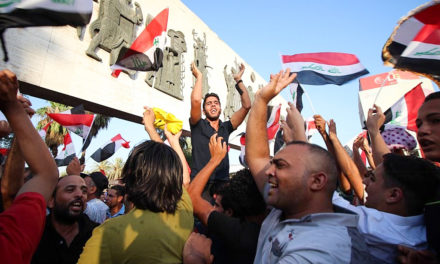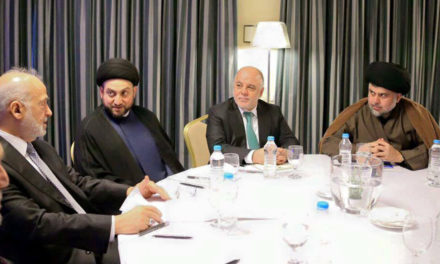On Wednesday, January 20, the Wall Street Journal published an op-ed for Aziz Ahmad, an aide to Masrour Barzani, the son of the Kurdistan region’s de facto ruler. Ahmad was falsely presented as an ordinary person, when he is an employee of the KRG. It is unclear if the Wall Street Journal was aware of Ahmad’s background and the potential conflict of interest. The op-ed is the latest in a series of attempts by the KRG’s PR to misinform domestic and international public opinion. Here are a few of the inaccuracies made by Ahmad’s op-ed:
The current Western strategy for defeating Islamic State has two components: a limited air campaign, and the delivery of weapons to Baghdad. Some of these weapons eventually make it into the hands of Kurdish Peshmerga forces here in Iraq’s Kurdistan region.” …Kurds in the north push for independence and have proved adept at reclaiming territories lost to Islamic State, despite the lack of weapons needed to outgun the terrorists.
Aziz Ahmad starts this op-ed by replicating a false accusation long made by the Kurdistan Regional Government against Baghdad. He suggests that only ‘some’ of the Western provided weapons actually reach the Peshmerga. This is a grave distortion of reality. Baghdad has done its utmost to deliver the Peshmerga’s entire share of weaponry in a timely manner. In a letter to Congress, Secretary of State John Kerry stated, “Baghdad has neither prevented nor delayed the delivery of equipment to the Ministry of Peshmerga. He adds, “It has supported a coalition that has provided the Peshmerga with thousands of tons of ammunition and equipment cost-free”.
Nor did Baghdad delay the delivery of weapons. According to the same letter by Secretary Kerry, the delivery of weapons to Baghdad for inspection, and the subsequent transfer from Baghdad to Erbil, adds less than a “few hours” to the transit time.
Indeed, it seems that Kurdish complaints about the lack of weaponry are aimed solely at misleading public opinion. According to Secretary of Defense Ash Carter, the Pentagon never received a single complaint from Kurdish officials that Peshmerga were not receiving enough weapons from Baghdad. In fact, the Peshmerga received over $350 million worth of weapons in 2015. This infographic illustrates the amount of weapons the Peshmerga have received:

Yet Sunni participation remains essential to a successful military strategy. It was direct American money and arms supplied to Sunni tribes in 2007, coupled with a surge in U.S. troops, that defeated Islamic State’s predecessor, al Qaeda in Iraq, and ended a bloody civil war between Shiites and Sunnis. A similar effort to win the trust of Iraqi Sunnis is missing today.
Here, Ahmad starts with two false assumptions, and ends with a call for ineffective strategy. First, he assumes that Sunnis are not participating in the fight against ISIS. Sunnis are an integral part of the effort to defeat ISIS. According to (Sunni) parliament speaker Salim al-Jiboury, 17,000 Sunnis are integrated to Popular Mobilization Units (PMUs) as of June 2015. In addition, Prime Minister Haidar al-Abadi approved 40,000 more Sunni fighters to be added to the PMUs. These figures don’t include the thousands of Sunni tribal fighters resisting the Islamic state in Haditha and al-Alam and elsewhere, nor the tribes of al-Bu Nimr and others who pledged to fight ISIS. Likewise, Sunnis make up large numbers of the Iraqi Army, federal police and the anti-terrorism service. Sunnis are also well represented in the Iraqi army and the Defense Ministry as a whole. To say that they are not fighting the Islamic State is inaccurate and dishonest.
The second false assumption Ahmad makes is considering the surge and creation of Sahwas as a successful counter-insurgency model. It has become clear that the Sahwas were a short-term solution that produced enormous long-term problems. Bribing Sunni tribesmen to turn their guns away from their countrymen and towards the Islamic State (al-Qaeda) could only be sustained for so long before those same tribesmen went back to the old ways. Even if we hypothetically, assume that this is an effective remedy, it is one Iraq cannot afford. In 2007-08, when that model was implemented, a barrel of oil was $140 and Iraqi coffers were full. Today it’s below $40 and the Iraqi government is struggling to pay the salaries of government employees. The presence of 150,000 American troops in Iraq at the time was a factor in making that model seem effective.

Legislation for an Iraqi national guard, supported by Sunni and Kurdish blocs, has stalled due to renewed opposition from Shiites wary of arming tribes that once acquiesced to the Islamic State conquest. Yet a cross-sectarian national guard that includes Sunni officers summarily dismissed by the U.S. occupational authority in Iraq would encourage Sunnis to turn their guns on Islamic State.
To put Ahmad’s words more bluntly: arm the same rogue elements that allowed the Islamic State occupy Sunni provinces, and reinstate Saddam-era officers who massacred Shi’is and Kurds before 2003. Shi’i concerns about giving weapons to groups and tribes that enabled the Islamic State are legitimate concerns, and should not be considered prejudiced. The same goes for most former Iraqi army officers, as many of them are beyond redemption. It is, in fact, no accident that the majority of the Islamic State’s military leaders are former Saddam-era officers. Bringing such elements back, obviously, is not a recipe for peace; it is one for perpetual violence.
What’s more, Ahmad implies that the Shia entirely oppose the passing of the National Guard Bill, when in reality, the bill was initiated by the ‘Shia-led’ cabinet, and later, passed two readings in the parliament. Shi’i factions disagree on whether the future National Guard would report to respective governors or to the Commander in Chief (prime minister).
More needs to be done. Sunnis rounded up under vague counterterror laws should be released. Former low-ranking members of the army and teachers should be reinstated. Sunni officials exiled on trumped up charges by Mr. Maliki should be invited to return to Baghdad for talks.
Ahmad makes these suggestions with complete disregard to the Iraqi constitution and judicial system. What he calls ‘vague’ counterterror laws (such as Article 4) are part of the Iraqi constitution. He unapologetically calls for ignoring those laws and releasing prisoners accused of running death squads and carrying out mass-casualty bombings, as if Iraq did not have a judicial system with due process. It’s easy for him (and the Kurdish Regional Government) to call for releasing terrorists. After all, the Kurdistan region, with its ethnic and racial profiling against Arab Sunnis is safe from the consequences of such proposals.
International support must be conditional on Mr. Abadi’s willingness to address the disproportionate ethnic and sectarian balance in the state security and intelligence apparatus. The Kurds, 20% of Iraq’s total population, today make up less than 2% of the Iraqi army.”
Again, Ahmad is twisting facts to make a disingenuous argument. Kurds make up less than 17% of Iraq’s population. In the political realm, whether in the cabinet or parliament, Kurds are overrepresented. In regards to the Iraqi army and the security apparatus, Kurds hold some of the most vital positions, such as the commander of the Iraqi Air Force, Deputy Chief of Staff for Intelligence and Security, Commander of the Iraqi Special Operations Force, not to mention a number of operational and divisional commands. Ahmad deceivingly paints Baghdad as having a discriminatory policy towards recruiting Kurds. Truth is, less than 2% of all Iraqi Kurds live outside the Kurdistan region and Kirkuk, and, consequently, most Kurds choose to join the Peshmerga. The Peshmerga, of course, is sanctioned by the Iraqi constitution, and federally financed by Baghdad. Surely, counting the tens of thousands of Peshmerga as being part of the Iraqi forces would paint a different picture than the one Ahmad has.
Without a Sunni ground force, Shiite militias shouldn’t spearhead battles to retake important cities such as Mosul, Iraq’s second-largest city. Doing so would only be seen as yet another sectarian invasion, inflaming rather than calming Sunni-Shiite tensions. Kurdish Peshmerga fighters remain the main ally and ground force of the U.S.-led coalition, but they’re opposed to moving beyond their delineated borders lest they are seen as occupiers of Arab land, yet another narrative that feeds into Islamic State propaganda.
This argument seems absurd given the liberation of Tikrit and Ramadi. Shi’i popular mobilization units, backed by the federal police and counter-terrorism service retook the entire Salah al-Din province from the Islamic State. Months later, Iraqi forces (with PMUs entirely sidelined), and with the participation of Sunni tribes, retook the city of Ramadi. The cities of Tikrit and Ramadi are two of four main Sunni urban centers in Iraq (Mosul and Fallujah being the other two). The aftermath of Tikrit was the return of all of the city residents who fled the ISIS invasion. Aside from a few alleged incidences of retribution by irresponsible factions, and by Sunni tribes against one another, peace has largely returned to Tikrit.
In Ramadi, the situation is even less complicated. There has been zero infighting after the city’s liberation, and residents welcomed Iraqi forces as saviors, as many families were being used as human shields by the Islamic State.
Although, Ahmad is correct to note that Sunnis are sensitive to Kurdish forces in their territory. Kurdish leaders don’t hide their ambition of expanding the borders of the future Kurdish state into Sunni land. The behavior of Kurdish forces is another reason why Sunnis don’t trust them. On January 19, Amnesty International released a report saying that the Peshmerga and KRG-allied Kurdish forces have bulldozed, blown up and burned down thousands of homes in an apparent effort to uproot Arab communities.

Once Islamic State is defeated, both Sunnis and Shiites must work toward a referendum on autonomy for Sunni provinces, similar to the Kurdish region in the north. Many Sunni officials now believe regional autonomy can address their fears of a marginalized future and Shiite fears of a bloody past.
Aziz Ahmad completes his series of distortions and half-truths by proposing that Shi’is and Sunnis form autonomous regions akin to the Kurdistan region because “Many Sunni officials now believe regional autonomy”. Ahmad maybe right in that some Sunni leaders want to form a semi-autonomous region. However, he fails to mention that the calls are coming from KRG backed Sunni politicians who are IDPs themselves in Erbil’s hotels with no support base. The Sunnis of Iraq (unlike their regionally sponsored leaders) are nationalists at heart. Sunnis, like their Shi’i brethren, oppose regionalism because they equate regionalism with partition. Even during the height of the civil war in 2007, only 3% of Sunnis said “yes” to the notion of regions, while 97% chose “one unified Iraq with a central government in Baghdad” as their preferred form of government.
One can’t help but wonder as to why the Kurdistan regional government continues to pay Washington PR firms to publish articles such as Ahmad’s here while being on the brink of bankruptcy and $18 billion deep in debt. Wouldn’t it have been more ethical to pay Peshmerga salaries so they don’t continue to sell their Western provided weapons in the black market to make a living?

Hamzeh Hadad
Hamzeh Hadad is a graduating senior at the University of King’s College in political science. His honours thesis focuses on the democratization of Iraq.










